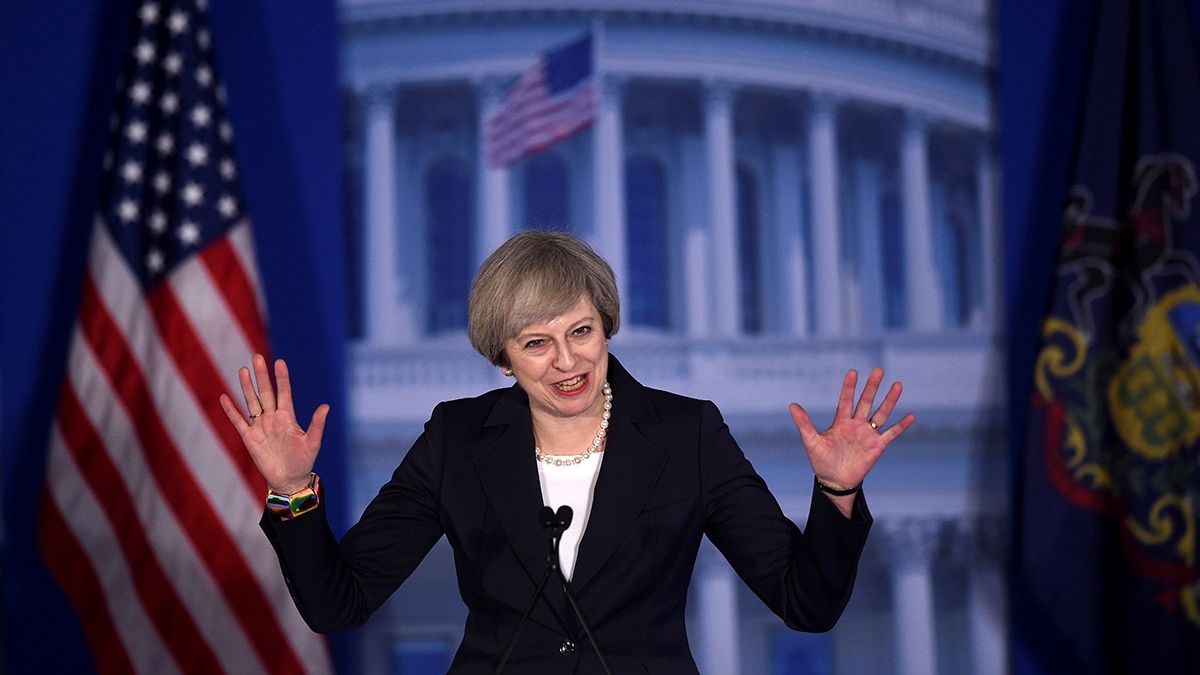Theresa May launched a wide-ranging charm offensive after arriving in the United States.
Theresa May launched a wide-ranging charm offensive after arriving in the United States. The British prime minister embraced President Donald Trump as a friend and ally, but cautioned him not to turn his back on global institutions and long-established political values.
On her first visit to the US as prime minister, May called the start of Trump’s term “a new era of American renewal” – but firmly rejected the president’s suggestion that torture might be acceptable, and rebuffed some of his foreign-policy views.
May flew to Philadelphia a day before holding talks with Trump at the White House – the first foreign leader to meet the president since his inauguration. May worked hard to get the invitation, and is seizing the opportunity to bolster the trans-Atlantic “special relationship” and work toward a US-UK free trade deal after Britain leaves the European Union.
She told a gathering of Republican lawmakers at their annual Congressional retreat that Britain outside the EU and the US under Trump can “lead together again” in the world, as they did when they set up the United Nations, NATO and other organizations – bodies Trump has strongly criticised.
Following their meeting on Friday, Theresa May said at a joint news conference with Donald Trump that the US president was “100 percent behind NATO” – despite his earlier comments describing the alliance as obsolete – while Trump sidestepped a question about whether he would lift US sanctions against Russia.
An honor to have U.K. Prime Minister
theresa_may</a> join me at the <a href="https://twitter.com/WhiteHouse">WhiteHouse. #ICYMI- our joint press conference: https://t.co/4pHDM45Fpepic.twitter.com/wBiWxA3sFz— President Trump (@POTUS) January 27, 2017
Nial O’Reilly, euronews, Lyon:
“We’re joined by our Washington correspondent Stefan Grobe. The prime minister has gone to the US to lay the foundations of a possible future trade deal, but she’s also spoken about a new non-interventionist UK-US approach to global conflicts. Yet she’s also signalled a tough line against Russia if one is needed. How has that been received by the Trump administration?”
Stefan Grobe, euronews Washington correspondent:
“For Theresa May this is a very dangerous game that she is about to play: dealing with Trump and his administration is a diplomatic challenge. And you mention trade – well that trade deal might be years in the making, and still not concluded after Trump or May have left office. So that’s a challenge itself. If you look at the policy positions that Trump and the London government have put forward, there are a lot of differences between Washington and London right now. Think about Russia, think about the role of NATO, think about the use of torture, think about the Iran nuclear deal… so there are a lot of things where Trump and May are not in agreement.”
Nial O’Reilly:
“In the context of the UK leaving the European Union, how will Europe view Britain’s efforts to deepen its relationship with Trump’s America?”
Stefan Grobe:
“Well the Europeans are a bit scared to be honest with you. I had the opportunity to meet with a top EU politician earlier this week, a former prime minister, who told me that the Europeans view this collusion between the Trump administration, and the British government and the Brexiters, very very cautiously. According to this ex-prime minister they know that Brexiters – British proponents of Brexit – have been lobbying Republican party circles for quite a long time to adopt an anti-Europe, anti-EU stance. This is seen as a dangerous development here by European leaders, at least in private. And they don’t really know what’s going to happen.”
Nial O’Reilly:
“Well one thing we do know, or that we seem to know, is that he seems to be delivering on his promise of a hardline stance on Mexico. How do you think that’s going to play out?”
Stefan Grobe, Washington:
“In public he’s playing the tough guy, but politically nothing has been settled, nothing has been arranged, and Republicans in Congress simply don’t know what’s going to happen. The simple announcement ‘there’s going to be a wall’: that’s not policy. What Trump is risking right now is a war of words with Mexico and the suggestion that a 20 percent import tax would do the trick: that’s really not going to happen, and there are a lot of economists in the US who point out that such a tax would eventually be paid by the American consumer. This is maybe not the solution, and Republicans in Congress have already acknowledged that.”
